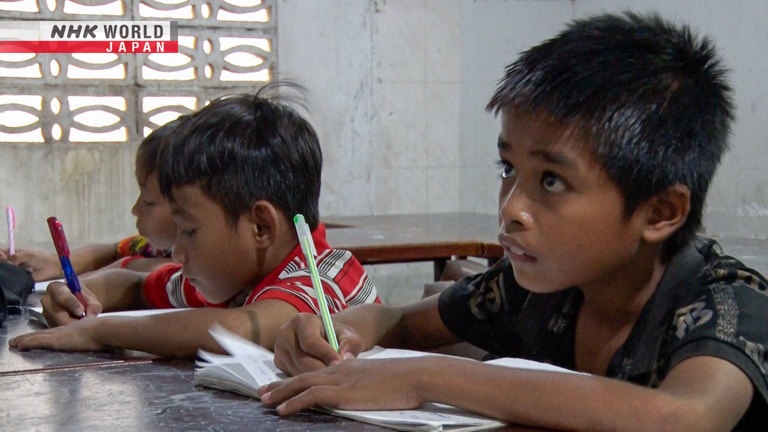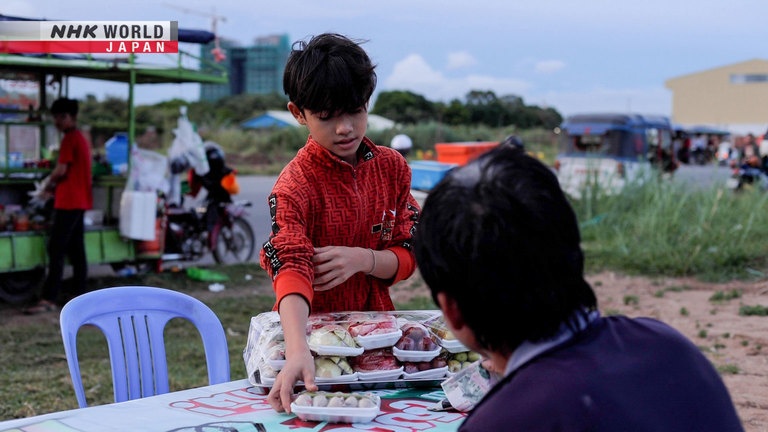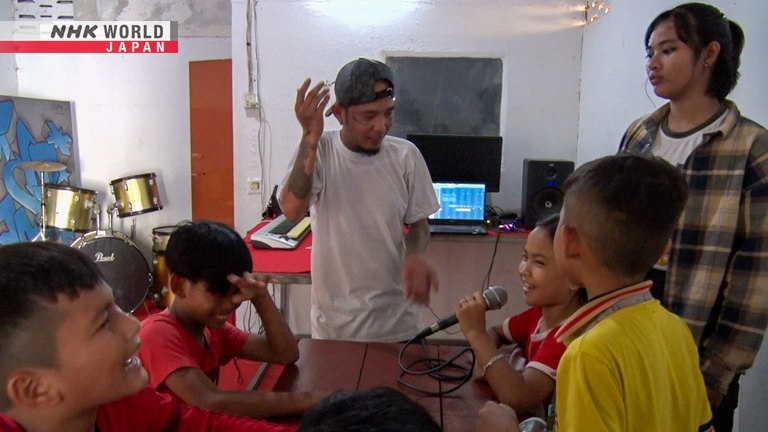Cambodia's Hip-hop School for Children
In 2005, Cambodia's first alternative school, Tiny Toones, was opened in Phnom Penh. In addition to general subjects, it adds courses on rap and dance into the mix. It was founded by a Cambodian man raised in the United States, who discovered a new purpose imparting his unique knowledge to young people. Most of the students come from impoverished backgrounds, and some enroll after dropping out of the public school system, or fleeing a turbulent family life. The school even provides dormitories to students if needed. In this episode, we meet the staff and children who have created a new place to belong through their shared love of hip-hop.



Transcript
In Cambodia's capital city of Phnom Penh, one alternative school is a favorite of local children.
It's called Tiny Toones.
In addition to subjects required in the public school system like language and math,
this school adds classes on hip-hop culture such as break-dancing and rap.
The founder of the school is a Cambodian man who was raised in America,
with experience as a street dancer in California.
I can't imagine life without hip-hop.
Hip-hop is like color to me.
Who'd want to live in a world without color?
There are numerous reasons students leave the public school system.
In this boy's case, it was to help repay his parents' debt.
Would you like a tray of fruit?
- How about it?
- No thanks.
Since I'm a kid, I have no choice.
These brothers live at the school away from their parents.
When I was 12, our mother got divorced,
and we had trouble getting by.
That's when we left school.
Each of the children attending Tiny Toones has their own unique reason.
In this episode, we chronicle the days spent at an alternative school
striving to give all children there a bright future.
In recent years, Cambodia has shown swift economic growth.
The government has established a free public school system,
but the number of available classrooms and teachers still fails to meet demand.
The schools respond by teaching two daily groups of students, split into the morning and afternoon.
Wealthy families get an edge by paying for tutors and cram schools.
Currently, nearly 100% of children attend elementary school.
But less than half of them go on long enough to graduate from middle school.
Those that drop out are usually grappling with situations in their home life.
Despite the national growth, an economic and educational status gap is widening.
One eastern district of Phnom Penh serves as home to many laborers
who have moved from the countryside for work: Chbar Ampov II.
Each morning at 7 AM, a tuk-tuk pulls into the neighborhood.
It shakes so much.
Its passengers are children.
This vehicle acts as school bus — an unusual sight in Cambodia.
It stops in front of homes to carefully pick up each child before school, and return them after.
Is your son ready?
It's time to go.
- He's putting his clothes on.
- Could you hurry?
In economically-challenged households,
many children have to work to support their families.
Picking them up directly gives a glimpse into their family life,
and discourages them from dropping out.
By the time school starts at just before 8 AM,
two school buses have made pickups at 40 homes.
The alternative school Tiny Toones is run by an NPO.
The buildings were converted from a former warehouse.
No age limits exist for enrollment,
sending the message to children that it's never too late to begin learning.
Classes are free.
Unlike in public schools, there are no uniforms,
and neither purchase of materials nor any donation is required.
The school provides a primary education for general subjects
such as the Khmer language and math.
Like in public schools, students are split among 2 time groups,
with both receiving the same curriculum.
Children are assigned to classes based on their academic level,
and they may attend the morning or afternoon groups freely.
Around 130 students are currently enrolled.
Some also attend public school while reinforcing their education here.
Some enroll only here, being unable to afford books and uniforms.
And some find the time to fit in classes around their work schedule.
- Do you have fun at Tiny Toones?
- It's fun because I have so many friends there.
The classes are great.
I told my parents how easy
it is to learn here.
There's one subject that's a standout among the students.
It's the weekly class on rap.
Very few public schools have music classes.
But here, they were included with the goal of inspiring children's love of song.
The instructor is a professional rapper, and what's more, he's a graduate of Tiny Toones.
At age 16, the school brought rap into his life.
The young kids get right into it.
The older ones are a little shy.
But I encourage them to sing.
Rap helps build confidence.
In Cambodia, more than 60% of families are reported to use corporal punishment as a means of discipline.
It leads many children to fear adults.
You're up next.
Lots of words start with G.
Word games are part of practice.
Grandpa.
The exercise helps each child to relax and open up.
Once they've gotten used to it, he simply passes them the mike.
Mountain bike.
After they've grown comfortable speaking,
the next step is to connect words with rhythm.
Eventually, the course attempts to let children freely express their thoughts and emotions through rap.
We don't pressure them. They can keep it up
if they like it, or just enjoy watching.
That's the way.
Open your legs and spin.
The founder of Tiny Toones is, Tuy Sobil.
His love of hip-hop caused him to learn break dancing,
after which he became a street dancer.
He was raised in the United States,
and came to Cambodia for the first time when he was 29.
I was brought up in the US,
But I'd never seen myself as American.
When I first came here, I didn't know
anything about Cambodia.
I couldn't even speak Khmer.
I was nervous.
Sobil was born in a Thai refugee camp after his parents fled Cambodia during the civil war.
Soon after, they relocated to California.
However, unable to find a vision for his life there,
he became wrapped up in fighting and theft.
Thanks to his discovery of break dancing he tried to reform his life,
but he was deported after an arrest in 2004.
My first experience here was
after being deported.
I had no idea how to go on living,
and thought my life was empty.
That's when I got to know
kids from the slums.
They asked me
"Can you teach us to dance?"
With a child's abrupt question, Sobil soon fell in love with teaching dance.
As the days passed, more and more kids joined him.
I asked them "Don't you go to school?"
Most of them didn't,
and some were even orphans.
That's when I remembered.
In America, everybody gets the chance
to attend school.
I started to think about what I could do
to let kids here do the same.
In 2005, Sobil opened Tiny Toones as Cambodia's first alternative school.
His goal was to provide a place to learn for any and all children.
Ra Sok Heng left the public school system 5 years ago,
and began attending here last year.
To catch up on the education he missed, he started with 3rd grade classes.
He lives around a 10 minute drive away from the school.
His family had resided in a farming village in southern Cambodia,
but unable to support themselves, they moved to Phnom Penh.
Their entire family of 6 lives in an apartment of less than 50 square meters.
Heng's older sister, younger brother, and a cousin all live there without attending public school.
His father bought a food cart to try and earn a better life for them in the city,
but unable to turn a profit, they were saddled with major debt.
Heng and the other children help sell trays of fruit and snacks prepared by their parents.
At 5 PM, Heng and his cousin are eating dinner.
They're about to head out to work.
Their destination is a plaza in east Phnom Penh.
At night, stands selling food and alcohol emerge there.
Would you like a tray of fruit?
I'll take this one.
They sell each pack for around 1 US dollar, with a profit of just 30 cents.
On nights before the weekend or holidays they sometimes sell out,
but on weekdays, they can't even sell half their load.
Would you like a tray of fruit?
- How about it?
- No thanks.
One by one, the children visit each stand along the road.
If the fruit doesn't sell well, it means even more legwork for them.
We're selling fruit.
Want a pack of it, mister?
- It must be hard working so late.
- Well, we're poor.
Since I'm a kid, I have no choice.
Heng keeps looking for buyers until 1 AM.
The next day, he takes part in afternoon classes.
Even if he's late, he insists on attending.
More than 2,500 students have graduated from Tiny Toones.
Some of them have even gone on to become professional musicians or singers.
A gathering of former students who went professional happen to be working on a new song.
Sang Sok Serey has become one of Cambodia's most recognized female rap artists.
Her big break came in the form of an anthem dedicated to a girl dealing with loneliness.
"Don't forget the pain, and stand back up.
No matter how dark it gets, keep on living."
The song struck a chord with other women,
and got her enough attention to perform on TV.
Lately she's been invited overseas, and her fame is still on the rise.
I'm trying to find music only we can make.
Some groups make typical music, but not us.
We'll make something sincere that
nobody else can imitate.
There's no point in
enjoying music alone.
We need to reach people's hearts
so that we'll last.
She recalls that when she made up her mind to be a rapper, people around her only laughed.
All the members experienced this.
Each time, they visited Tiny Toones.
They went to meet with Sobil.
They recall that speaking with him gave them the will to persevere.
Nobody can do everything perfectly.
That's why I say it's important to try.
Start by learning, and improve it.
Keep at it and you'll find your own way.
At the entrance to Tiny Toones is a sign with Sobil's own words.
It reminds children to respect each other, learn together, and treat all people with equality.
These are the core values of the school.
You're looking slim. Lost the gut.
Sobil's cheerful personality is always encouraging.
To graduates of the school, this place feels like home.
Every day, the school echoes with the excitement of students.
But some students end up staying there after becoming unable to return home.
The school set a room aside to accommodate such cases.
This is a simple dormitory for students with nowhere else to turn.
Some children ran from violence at home.
Others saw their families crumble, leading to divorce.
Over the years, many students who lost their place to belong found solace here.
There used to be a lot more kids living here.
They ended up finding work
and making their own ways.
The caretaker of the room is a former student
who now works at the school as a member of their staff.
At age 16, he too lived here.
I ran when my family fell apart.
There was fighting all the time.
I couldn't stand it.
If I hadn't met Sobil, I don't think
I'd have found meaning in my life.
January, 2023.
Two new occupants come to the room.
Den Dawing and his younger brother Ravy are taking fourth-grade classes at the school.
They were born in a farming village in western Cambodia,
and moved to Phnom Penh a year ago with their mother.
However, her work prevented them from living together.
The brothers live on $25 sent by her each month.
When I was 12, our mother got divorced,
and we had trouble getting by.
That's when we left school.
After that, we got work at
an auto repair shop.
For five years, both brothers worked from morning till night.
They missed out on play, study, and all other normal facets of childhood.
What do you enjoy at Tiny Toones?
Studying, and dancing.
The two of them always stick together.
When they first enrolled, they rarely smiled.
But they started to show a change as they learned breakdancing.
The enthusiasm toward being able to move freely brought them new curiosity and joy.
After classes end, they eat dinner in a hurry.
There is something the brothers have been looking forward to all day.
A group of Tiny Toones graduates is getting together.
Five days a week they gather in a classroom for practice.
The students from a variety of graduation years have formed a dance team, CA Star.
While holding down their own jobs, they aim for the chance to go pro.
Having started to learn breakdancing, Dawing holds huge respect for them.
The group is currently competing on a popular Cambodian TV program.
It's an audition show that attracts challengers from all over the country.
Dawing watches the show each week without fail.
So far their team has progressed smoothly, advancing to the semifinals.
Two more wins would make them the champions.
Dawing follows along with them.
Swing back hard.
Give it a strong kick.
That's it, like you're bending back.
Higher.
The next day, Dawing tries his hand at an exercise in the rap class.
Try telling something about
yourself with the rap.
"I'm so poor and I got no girl.
How do I make it out of this life?"
"Get on a bike, go to the shop.
There's a pretty lady, hello girl."
"I want to change who I am.
Change myself and make friends."
What are your hopes for the future?
In three years, I'd like to be a dancer.
I'm studying the techniques
so that I can get good.
I'll keep trying.
Meanwhile, Heng studies diligently.
I got it.
In the future, he wants to become a teacher.
- Do you have fun at Tiny Toones?
- Yeah.
It's fun to cut loose and dance.
Sobil founded the school before he had gotten used to speaking Cambodian.
With his troubled past and no one to rely on, he had to find his own way.
Was it hard keeping Tiny Toones going?
Man, was it ever. It came down to
me having too many tattoos.
That, and people heard about
me being deported.
It was hard for them to stick up for me,
and some figured I hadn't reformed.
But I changed as a person.
When I came to Cambodia, I was feeling
completely lost.
It was the kids here that gave me
a purpose in life.
Through much uncertainty, together with the children of Cambodia,
Sobil brought life to Tiny Toones.
The graduates of the school created a song in his honor.
"Back then I knew nothing, but now I'm a DJ.
It's all because of what Sobil taught me."
"Tiny Toones, the first hip-hop school.
If you feel lost, that's where you go."
"I learned hip-hop from Tiny Toones.
People looked down on me, but the world's my stage."
"He told us not to hold back.
Sobil always had our backs."
Each day, children in Cambodia stumble upon harsh realities.
But Sobil is there, ready to welcome them into the world of hip-hop.
This new color he adds to their lives
is enough to give them hope and put a spring in their steps.